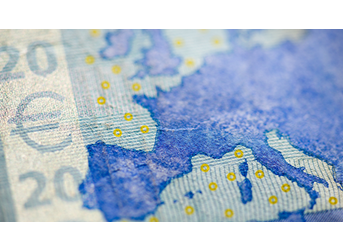Cross border B2B payments to Ireland
Quick, simple and transparent international transfers in euros



How we can help your business makes its money transfers to and from Ireland
Forward Contract
Forwards allow you to buy currency on an agreed future date at a pre-fixed rate. This may require a deposit and allows you to lock in a rate for up to two years.*
Spot Contract
This is an agreement between you and your FX provider to buy currency at the present exchange rate, and it can be used for imminent payments.
FX Orders
If you need a particular exchange rate but have no urgency to purchase straight away, an FX order could help you secure a better deal.
FX Options
Designed for foreign exchange rate management, options can be created as a bespoke solution for your business and its payment needs.**
Ireland is one of Europe’s strongest-performing economies, in large part due to its attractive business environment that provides a number of advantages for companies seeking to expand their portfolios.
There are a number of key ingredients that have contributed to the prosperity that Ireland has enjoyed in recent decades. It is the only European country that is a member of the European Union, a member of the Eurozone and is English-speaking.
Perhaps the most important factor, however, are the incentives offered to industry leaders in the form of its low tax policies. Ireland’s corporate tax rate is 12.5%; in most European countries, the average corporate rate is above 20%, which hands Ireland an enviable competitive advantage. Whilst Ireland’s rate has been set at 12.5% since 2003, most foreign multinationals pay a mere fraction of this in practice, and it is likely that this will remain the case even after the rate has been increased to 15%. Another piece of the puzzle is Ireland’s business-friendly environment for R&D activities: Ireland offers a generous 25% volume-based R&D tax credit.
Ireland’s capital, Dublin, is often referred to as Europe’s ‘silicon valley’, which is hardly surprising given the sheer number of tech, social media and finance companies that have decided to headquarter in the city.
Doing business in Ireland is not without its drawbacks, of course. Start-ups seeking finance options sometimes struggle, and there are real concerns with regard to a lack of office space available for rent. It would be fair to say, however, that Ireland’s strengths far outweigh its weaknesses; whilst this is so, it’s worth taking the time to familiarise oneself with the issues involved in starting a business in Ireland.
Guide to setting up a business in Ireland
Why start a business in Ireland
Ireland ranks in seventh position out of 33 EMEA countries as a place for private businesses to succeed. As the only remaining English-speaking country in the EU, doing business in Ireland is appealing to major corporations including Apple, Google, Pfizer and Facebook as a location for European headquarters.
Low corporate taxation and regulation mean that setting up a business in Ireland holds a strong appeal. Ireland’s thriving knowledge economy has built an innovative and dynamic environment that continues to attract investors and start-ups from around the world.
International trade and increasing foreign direct investment are priorities in Ireland, which means that Irish business is appealing for foreigners, but it still requires research and local knowledge to navigate the commercial and regulatory environment.
What are the major industries in Ireland?
Ireland is a knowledge economy, which makes for a dynamic business environment. Much of the focus in this relatively small country is on exports. Industry has overtaken agriculture and now accounts for more than 90% of exports and 40.2% of GDP. As well as IT and service industries, some of the biggest industries in Ireland rely on expertise in areas such as technology, pharmaceuticals, chemicals, instruments and machinery.
The country is rich in natural resources, which means that agriculture, forestry, mining and fishing are all important business sectors in Ireland, while food exports include some high-value brands. Among the fastest-growing industries, medical technology and pharmaceuticals are two that have succeeded in attracting investment: more than $340m was spent on R&D in Ireland’s MedTech sector in 2020, and Ireland currently boasts the highest number of people employed in Europe’s medical device industry in per capita terms.
The arrival of major players in the tech space such as Twitter, Amazon and eBay, all of which have premises in Dublin, has also attracted a high number of supplementary ICT and software start-ups. Software and related services and solutions account for a significant proportion of industry exports. There has also been a strong resurgence of financial services in the aftermath of the financial crisis in 2008, and Ireland, much like France, has enjoyed significant growth following the UK’s departure from the EU, as major firms have looked to relocate from London to ensure that they have continued access to the EU’s financial and regulatory system.
For the latest updates regarding Brexit and what it will mean for different business sectors in Ireland, visit our Brexit Hub.
How to register a business in Ireland
Whilst there may be challenges involved in registering a business in Ireland, the process is relatively straightforward. Let’s look at how to set up a business in Ireland.
Setting up a limited company involves appointing at least one director and a company secretary, appointing at least one shareholder, choosing a registered address in Ireland and choosing a company name. This name will need to be registered with the Companies Registration Office (CRO). The following forms will need to be submitted, in addition to a registration fee (€40 for paper filing/€20 for electronic filing) within one month of adopting the business name:
• Form RBN1: for an individual
• Form RBN1A: for a partnership
• Form RBN1B: for a body corporate
Registering in Ireland as a limited company ensures a separate legal identity, which has less liability. As well as registration with the CRO, a limited company is required to file company accounts every year. Bear in mind that at least one director of every Irish company must be an EEA resident; alternatively, a €25,000 ‘bond’ will need to be paid every two years, or the company needs to appoint an Irish resident as a non-executive director to satisfy requirements.
For simplicity’s sake, registering as a sole trader in Ireland, on the other hand, may be the right choice – you will be required to register as self-employed with the tax office and register your business name with the CRO. This carries the most liability, however; if your business fails, your personal assets will be at risk to pay creditors.
A partnership shares that risk between more individuals; if you opt for a partnership structure, a legal partnership agreement will need to be drawn up by a solicitor.
Whichever option works best for your business model, take note of the different processes. Business registration in Ireland takes about a week to process; however, preparing all the documentation may take longer once delays have been taken into account.
How much is corporation tax in Ireland?
Whilst not quite the tax haven that it is sometimes believed to be, Ireland does have low taxation and a relatively light regulatory environment. Corporation tax in Ireland is 12.5% for trading income, with a rate of 25% levied for non-trading income, e.g. rental income. This makes the country very appealing to innovative new start-ups and companies making significant investments in R&D.
Ireland has tax treaties in place with over 70 countries; these treaties help ensure that income that has been taxed in one country is not taxed again in another jurisdiction. While much has been made of Ireland’s tax regime, especially as regards the issue of multinational tax avoidance, the OECD’s Corporate Tax Statistics report found that the effective tax rate paid in Ireland is 12% - a rate just under the statutory rate of 12.5%. This indicates that the scale of tax avoidance has been exaggerated.
What are the challenges of conducting business in Ireland?
Doing business in Ireland presents several specific challenges for foreigners. There are residency requirements for at least one of the company directors, for example. Exports form a major part of the economy, but exposure to fluctuations in international trade can present risks of doing business in Ireland. It takes an average of seven days to export goods and 12 days to import goods, each requiring four separate documents and a significant business resource.
There is an Immigrant Investor Programme (IIP), which is designed to support non-EEA investors planning to start a business in Ireland with the aim of remaining in country. A working visa would still be required, but the IIP can provide support for a visa application. The programme is divided into four different categories:
1) Enterprise investment of a minimum €1m aggregate investment into a new or existing Irish business;
2) An investment of €1m into an investment fund for a minimum of three years;
3) A minimum €2m investment in a Real Estate Investment trust (REIT); or
4) An endowment of at least €500,000 to project that benefits the arts, sports, health, culture or education.
There is also a start-up entrepreneur programme which welcomes expats, including non-EU citizens and can support a visa application. Detailed plans of the business and minimum funding of €50,000 are required and business plans should demonstrate that the venture is a new product or service less than five years old, has international appeal, is involved in manufacturing or services with export potential, is projected to create at least ten jobs in Ireland, will generate €1m total sales over four years, is headquartered in Ireland and is led by an experienced management team.
This means that you’ll need a very clear plan of your business before you can make the visa application, but that application will also apply to your partner and any dependent children. If approved, you’ll receive an initial two-year visa with options to extend or apply for residency after five years.
What are the biggest opportunities for doing business in Ireland?
As one of Europe’s fastest-growing economies, Ireland offers a stable, competitive business environment, and there are, therefore, a number of advantages of doing business in Ireland.
Ireland’s appeal has only grown in the aftermath of Brexit, as it offers a trading gateway into the European Union and its 447m consumers without any exchange rate risk. Whilst Ireland’s corporation tax rate is set to rise to 15% for large companies, it’s highly unlikely that the multinationals that have called Ireland home for the last few decades will leave; indeed, Dublin looks set to be a hub for tech companies, start-ups and innovative research and development for the foreseeable future.
From an export perspective, there are myriad opportunities. Ireland’s construction industry is one of the main drivers of growth, and so there is huge demand for imports of aluminium, glass, iron and steel. Ireland’s agriculture sector is one of the most profitable and efficient, and so there is an opening for companies that can meet the demand in the Irish market for new agriculture technologies.
What is the business etiquette in Ireland?
The standard business dress in Ireland is smart and conservative. As in other jurisdictions, small talk is a pre-meeting staple; however, you would be well-advised to avoid the topics of politics and religion! Conversation about sports is a much safer bet.
Irish business culture tends to be very egalitarian, and more relaxed in style than that on the Continent. However, there is a strong emphasis on treating others equally and with respect. Firm handshakes and close eye-contact with all who have been invited to business meetings are imperative.
Doing business in Ireland with Moneycorp
Moneycorp offers global payment solutions for your business needs and extensive options to protect your money from exchange rate movements. Send money to and from Ireland with ease through our international payment service.
Sign up for a business account with Moneycorp today.
Get in touch & learn more about how we can send money to and from Ireland



